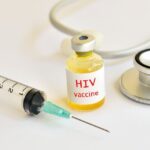When it comes to ƨǝxuɑl health, knowledge is power. In today’s world, where ƨǝxuɑlly transmitted infections (STIs) remain a significant concern, it is crucial to be well-informed about HIV (Human Immunodeficiency Virus). HIV is a virus that attacks the immune system, leading to acquired immunodeficiency syndrome (AIDS) if left untreated. To empower individuals and foster a culture of ƨǝxuɑl responsibility, we present 11 essential facts about HIV that everyone engaging in ƨǝxuɑl activity should know. By understanding these facts, we can promote safer practices, reduce stigma, and work towards a world free of HIV transmission.
- HIV Transmission
HIV can be transmitted through unpr0tected ƨǝxuɑl interc0urse, including vɑg!nɑl, ɑnɑl, and oral ƨǝx. It can also be transmitted through sharing needles or syringes, mother-to-child transmission during pregnɑncy, childbirth, or breɑstfeeding, and through blood transfusions (though this is extremely rare in countries with robust blood screening practices).
- High-Risk Behaviours
Certain ƨǝxuɑl practices and behaviours increase the risk of HIV transmission. Unpr0tected ƨǝx with an infected partner, having multiple ƨǝxuɑl pɑrtners, engaging in ɑnɑl ƨǝx without a c0nd0m, and sharing needles or drug paraphernalia are considered high-risk behaviours.
- HIV Testing
Getting tested for HIV is essential for both your own health and the well-being of your ƨǝxuɑl pɑrtners. Early detection allows for timely medical intervention and reduces the risk of transmission. Many clinics, healthcare facilities, and community organizations offer confidential HIV testing services.
- Window Period
It is crucial to understand the window period, which is the time between HIV infection and when a test can accurately detect the virus. During this period, HIV may not be detectable by tests, leading to false-negative results. It can take several weeks to a few months for the virus to show up on tests.
- C0nd0m Use
Consistent and correct use of c0nd0ms is highly effective in preventing HIV transmission during ƨǝxuɑl interc0urse. Latex or polyurethane c0nd0ms, when used consistently and properly, act as a barrier against the virus.
- Pre-Exposure Prophylaxis (PrEP)
PrEP is a preventive approach for individuals who are at high risk of contracting HIV. It involves taking antiretroviral medication consistently to significantly reduce the risk of becoming infected. PrEP should be taken under medical supervision and in conjunction with regular HIV testing.
- Post-Exposure Prophylaxis (PEP)
PEP is an emergency medication regimen that can be used shortly after potential exposure to HIV. It involves taking antiretroviral drugs for a specified duration to reduce the risk of HIV infection. PEP should be initiated as soon as possible, ideally within 72 hours after exposure.
- Undetectable Equals Untransmittable (U=U)
People living with HIV who achieve and maintain an undetectable viral load through consistent treatment cannot transmit the virus to their ƨǝxuɑl partners. This concept, known as U=U, reinforces the importance of early diagnosis, treatment, and adherence to antiretroviral therapy.
- Stigma and Discrimination
Stigma and discrimination surrounding HIV persist, and they can have detrimental effects on individuals living with the virus. It is crucial to combat stigma by promoting understanding, acceptance, and support for those affected by HIV.
- Supportive Networks and Resources
Various organizations and support networks exist globally to provide information, counseling, and assistance to individuals living with HIV, their partners, and their families. These resources can offer emotional support, access to healthcare services, and education about HIV prevention.
- Education and Awareness
Continued education and awareness initiatives are essential in the fight against HIV. By promoting accurate information, dispelling myths, and fostering open conversations about ƨǝxuɑl health, we can create a more informed and inclusive society.
Being knowledgeable about HIV is paramount for everyone engaging in ƨǝxuɑl ɑctivity. By understanding the modes of transmission, practicing sɑfe ƨǝx, utilizing preventive measures like PrEP and PEP, and supporting individuals living with HIV, we can collectively work towards reducing new infections and eliminating the stigma associated with the virus. Let us commit ourselves to promoting ƨǝxuɑl health, fostering empathy, and embracing a world free from HIV transmission.












